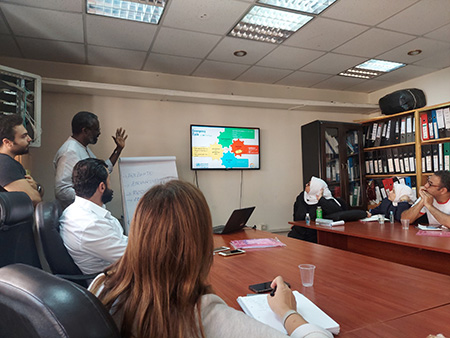 3 September 2023– Damascus, Syria – The World Health Organization (WHO) is working with the Syrian Ministry of Health (MoH) to establish the country’s first Public Health Emergency Operations Centre (PHEOC). The PHEOC will be located in Damascus and is expected to be operational by the end of the year.
3 September 2023– Damascus, Syria – The World Health Organization (WHO) is working with the Syrian Ministry of Health (MoH) to establish the country’s first Public Health Emergency Operations Centre (PHEOC). The PHEOC will be located in Damascus and is expected to be operational by the end of the year.
The recent COVID-19 pandemic has highlighted the need for ever closer vigilance and cooperation among countries. The PHEOC will support Syria’s commitments under the International Health Regulations (2005), which require countries to develop, enhance and maintain their capacity to respond promptly and effectively to public health risks. It will serve as a central point for emergency planning and for gathering, analyzing and disseminating information on the impact of any emergency on the Syrian health system and health care facilities. The PHEOC concept and network were first established by WHO in 2012.
WHO has rehabilitated and equipped the PHEOC and is currently focusing on operationalizing it . In addition to providing equipment and training, WHO is working closely with Ministry of Health to develop the legal framework and PHEOC handbook. The framework will legalize the installation of the EoC structure within the health system and identify the role and responsibilities of the EoC towards different units, programs, and sectors. The PHEOC handbook will serve as a guide for the EoC team, including the scope/mode of work, monitoring and evaluation, and response mechanisms.
“The establishment of Syria’s first PHEOC will mark an important milestone in our efforts to improve health security in the country,” said Dr Iman Shankiti, WHO Representative a.i. “The PHEOC will provide an essential platform for the coordination of public health emergencies, and will help ensure that Syrians are better protected from future health threats.”
“It is our objective to assist the MoH in building a strong PHEOC to support future public health emergencies,” said Samar Hammoud, WHO Regional Technical Emergency Officer.
Following the launch of the first PHEOC, the MoH plans to establish sub-national PHEOCs in all 14 governorates, beginning with Lattakia and Aleppo. A network of PHEOCs throughout the country is expected to enhance cooperation between experts in the different governorates and help bypass political and geographical barriers to collaboration.




